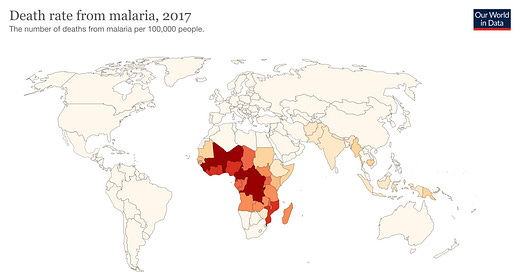The history of malaria
Malaria has plagued humans for thousands of years. It is thought to have claimed the lives of ancient historical figures like Alexander the Great, Pope Innocent III and Raphael, the Renaissance artist.
For centuries people believed that malaria was caused by breathing vapours arising from bodies of stagnant water. Hence the name “mal” “aria”, or “bad air.” It was only in 1902 that British bacteriologist Ronald Ross discovered that malaria was transmitted by mosquitoes, for which he won the Nobel Prize for Physiology or Medicine.
Malaria today
Bednets and malarial drugs have reduced malaria deaths in recent years. However, according to the WHO, in 2019, malaria still caused an estimated 229 million clinical episodes and 409 000 deaths (mostly in Sub-Saharan Africa and children). As the world gets hotter through climate change, mosquitoes are expected to start living in new places, so we’ll see cases of malaria where they’ve never appeared before.
Vaccine breakthrough
Last week saw a breakthrough in this fight against the disease. A vaccine developed by the University of Oxford proved to be 77% effective in early trials carried out on 450 children in Burkina Faso. Larger trials will be carried out across four African countries to confirm the findings in the next three years.
Considering the thousands of genes in malaria (compared to around a dozen in coronavirus) and the high immune response needed to fight off the disease, developing a vaccine has been particularly challenging and decades in the making.
It is hoped that these miraculous advances in technology will pave the way to eradicating malaria.




